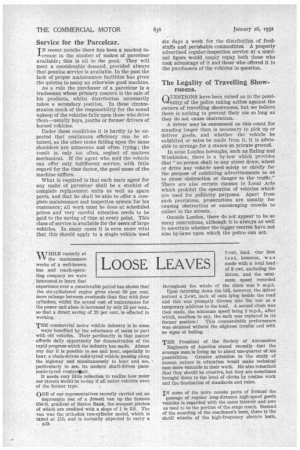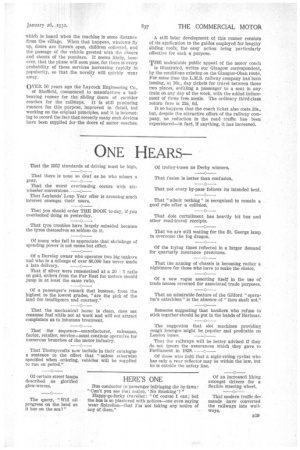LOOSE LEAVES
Page 32

Page 33

If you've noticed an error in this article please click here to report it so we can fix it.
W HILE recently at the maintenance works of a well-known bus and coach-operating company we were interested to learn that experience over a considerable period has shown that the six-cylindered engine gives about 50 per cent. more mileage between overhauls than that with four cylinders, whilst the actual cost of maintenance for the power unit alone is increased by only 25 per cent., so that a direct saving of 25 per cent. is effected in working.
THE commercial motor vehicle industry is in some ways benefited by the reluctance of users to part with old vehicles. Their pertinacity in that matter affords daily opportunity for demonstration of the rapid progress which the industry has made. Almost any day it is possible to see and hear, especially to hear, a chain-driven solid-tyred vehicle passing along the highway and simultaneously to hear and see, particularly to see, its modern shaft-driven pneumatic-tyred counteraart.
It needs very little reflection to realize how noisy our streets would be to-day if all motor vehicles were of the former type.
ONE of our representatives recently carried out an impromptu test of a Jowett van up the famous 950-ft. gradient of Sutton Bank, the steepest pitches of which are credited with a slope of 1 in 3.9. The van was the orthodox two-cylinder model, which is taxed at £10, and is normally expected to carry a 1318 7-cwt. load. Our first t e s t, however, w a s made with a total load of .8 cwt. excluding the driver, and the mini mum speed recorded throughout the whole of the climb was 8 m.p.h.
Upon returning down the hill, however, the driver noticed a 2-cwt. sack of oats lying beside the road and this was promptly thrown into the van as a temporary addition to the load. A second climb was then made, the minimum speed being 5 m.p.h.., after which, needless to say, the sack was replaced in its former position! This commendable performance was obtained without the slightest trouble and with no signs of boiling.
THE President of the Society of Automotive Engineers of America stated recently that the average man is living up to about one-quarter of his possibilities. Greater attention to the study of human nature in education would make technical men more valuable in their work. He also remarked that they should be creative, but they are sometimes brought down to the level of clerks by routine work and the domination of standards and rules.
IN some of the more remote parts of Ireland the passage of regular long-distance high-speed goods vehicles is regarded with the same interest and awe as used to be the portion of the stage coach. Instead_ of the sounding of the coachman's horn, there is the shrill whistle of the high-frequency electric horn, which is heard, when the machine is some distance from the village. When that happens, windows fly up, doors are thrown open, children collected, and the passage of the vehicle greeted with the cheers and shouts of the populace. It seems likely, however, that the phase will soon pass, for there is every' probability of these services increasing rapidly in popularity, so that the novelty will quickly wear away.
OVER 50 years ago the Laycock Engineering Co., of Sheffield, commenced to manufacture a hallbearing runner for the sliding doors of corridor coaches for the railways. It is still producing runners for this purpose, improved in detail, but working on the original principles, and it is interesting to record the fact that recently many such devices have been supplied for the doors of motor coaches. A still later development of this runner consists of its application to the guides employed for lengthy sliding roofs, the easy action being particularly effective for such a purpose.
THE undeniable public appeal of the motor coach is illustrated, writes our Glasgow correspondent, by the conditions existing on the Glasgow-Oban route. For some time the L.M.S. railway company has been issuing, at 16s., day tickets for travel between these two places, entitling a passenger to a seat in any train on any day of the week, with the added inducement of three free meals. The ordinary third-class return fare is 22s. 6d.
It so happens that the coach ticket also costs 16s., but, despite the attractive offers of the railway company, no reduction in the road traffic has been experienced—in fact, if anything, it has increased.






























































































